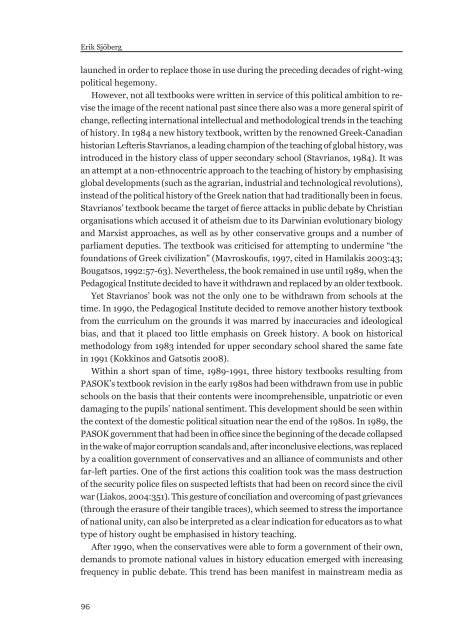Download issue - Umeå universitet
Download issue - Umeå universitet
Download issue - Umeå universitet
You also want an ePaper? Increase the reach of your titles
YUMPU automatically turns print PDFs into web optimized ePapers that Google loves.
Erik Sjöberg<br />
launched in order to replace those in use during the preceding decades of right-wing<br />
political hegemony.<br />
However, not all textbooks were written in service of this political ambition to revise<br />
the image of the recent national past since there also was a more general spirit of<br />
change, reflecting international intellectual and methodological trends in the teaching<br />
of history. In 1984 a new history textbook, written by the renowned Greek-Canadian<br />
historian Lefteris Stavrianos, a leading champion of the teaching of global history, was<br />
introduced in the history class of upper secondary school (Stavrianos, 1984). It was<br />
an attempt at a non-ethnocentric approach to the teaching of history by emphasising<br />
global developments (such as the agrarian, industrial and technological revolutions),<br />
instead of the political history of the Greek nation that had traditionally been in focus.<br />
Stavrianos’ textbook became the target of fierce attacks in public debate by Christian<br />
organisations which accused it of atheism due to its Darwinian evolutionary biology<br />
and Marxist approaches, as well as by other conservative groups and a number of<br />
parliament deputies. The textbook was criticised for attempting to undermine “the<br />
foundations of Greek civilization” (Mavroskoufis, 1997, cited in Hamilakis 2003:43;<br />
Bougatsos, 1992:57-63). Nevertheless, the book remained in use until 1989, when the<br />
Pedagogical Institute decided to have it withdrawn and replaced by an older textbook.<br />
Yet Stavrianos’ book was not the only one to be withdrawn from schools at the<br />
time. In 1990, the Pedagogical Institute decided to remove another history textbook<br />
from the curriculum on the grounds it was marred by inaccuracies and ideological<br />
bias, and that it placed too little emphasis on Greek history. A book on historical<br />
methodology from 1983 intended for upper secondary school shared the same fate<br />
in 1991 (Kokkinos and Gatsotis 2008).<br />
Within a short span of time, 1989-1991, three history textbooks resulting from<br />
PASOK’s textbook revision in the early 1980s had been withdrawn from use in public<br />
schools on the basis that their contents were incomprehensible, unpatriotic or even<br />
damaging to the pupils’ national sentiment. This development should be seen within<br />
the context of the domestic political situation near the end of the 1980s. In 1989, the<br />
PASOK government that had been in office since the beginning of the decade collapsed<br />
in the wake of major corruption scandals and, after inconclusive elections, was replaced<br />
by a coalition government of conservatives and an alliance of communists and other<br />
far-left parties. One of the first actions this coalition took was the mass destruction<br />
of the security police files on suspected leftists that had been on record since the civil<br />
war (Liakos, 2004:351). This gesture of conciliation and overcoming of past grievances<br />
(through the erasure of their tangible traces), which seemed to stress the importance<br />
of national unity, can also be interpreted as a clear indication for educators as to what<br />
type of history ought be emphasised in history teaching.<br />
After 1990, when the conservatives were able to form a government of their own,<br />
demands to promote national values in history education emerged with increasing<br />
frequency in public debate. This trend has been manifest in mainstream media as<br />
96

















